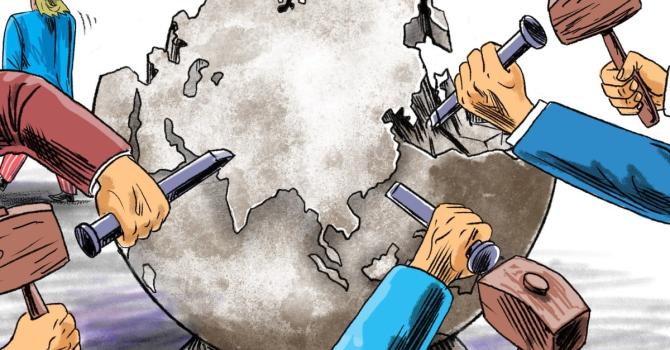SCMP: US-China trade war is Hong Kong’s opportunity to prove its value to Beijing
Christine Loh says the new trade war is just the opening salvo in a realignment of the US-led global order. As China eyes a larger role, Hong Kong – with its special privileges under the Basic Law – should use its freedom of travel and trade to open opportunities other Chinese cities cannot, instead of seeking to challenge Beijing
The “trade” conflict between the United States and China is really about geopolitics rather than trade. A refashioning of the world order has begun. This reshaping is going to take decades. The process will be non-linear and often unpredictable. These changes are going to affect Hong Kong, without question.
Since Donald Trump was inaugurated as US president in January 2017, he has caused geopolitical rifts far and wide, even with America’s neighbours Mexico and Canada over border and trade issues respectively.
Another sign of geopolitical displacement is the loosening of the long-standing transatlantic alliance between the US and Europe.
Europeans feel the Trump administration is tearing down the post-second-world-war international order that the US helped build, which included the encouragement of multilateral trade and liberal democracy.
The US has provoked a number of disagreements with Europe that includes tariffs, withdrawal from multilateral agreements on climate change and Iran’s nuclear proliferation, as well as defence spending. The recent imposition of tariffs on European steel and aluminium imports to the US resulted in the European Union launching a case at the World Trade Organisation to challenge the new duties.
As for China, the US feels the Chinese politico-economic system is a threat to its longer-term interests and global leadership. Of concern is that the system has proved quite successful.
At the same time, China is seeking to show that its socialist party-state system gives it legitimacy in achieving development success; and it is also expanding its military and diplomatic strength as a matter of priority at a time when there are opportunities to form new alliances.
The recent flurry of activity from many nations provides a glimpse of these unexpected opportunities as the US adopts a less engaged approach in international affairs.
The US sees the trade war as China containment policy. So does Beijing In early July, aiming at the US, China and the EU jointly stated their opposition to trade protectionism, and accelerated negotiations on trade and investment deals. Just before that, China had published a white paper on the WTO to explain its actions and commitments since becoming a member in 2001, including reducing tariffs, opening up markets and revising more than 200,000 regulations and laws to show that it has been playing by agreed rules.
At the same time, China, India and Pakistan appear to be edging towards discussing border defence, which would represent a breakthrough in regional relations; and China and Asean agreed to joint maritime exercises in the South China Sea later this year.
After the North Korea-US summit last month in Singapore, discussions are taking place between China and South Korea on new infrastructure and trade opportunities that could transform the whole of the Korean peninsula if and when North Korea embarks on denuclearisation. Sino-Japanese relations also appear to be warming. Thus, there is the possibility of forging a regional free trade accord.
Hong Kong should think strategically about how it can position itself as part of China, as well as externally, against this backdrop of geopolitical change. The goal is to be recognised as having the capability to assist the mainland in its plan to achieve its modernisation goal by 2035, while at the same time providing useful services as the rest of Asia advances.
Hong Kong should be clear-headed about why it remains irreplaceable to the mainland: it’s free operating environment and rule of law are vital; its ability to conduct “external affairs” under the Basic Law is a privilege no mainland Chinese city has; its vast network of global connections is another unique characteristic; and it remains politically important to Beijing that the “one country, two systems” project is successful.
With more than two decades of experience as a special administrative region, Hong Kong should emphasise how its system can serve the nation rather than be considered a threat. What Beijing finds hard to stomach is for Hong Kong’s freedoms to be used to justify disrespect, such as poor behaviour when the national anthem is played, or calls for secession and independence.
Perhaps the worst transgression in Beijing’s eyes is for the opposition to team up with Taiwan’s pro-independence activists, especially during this sensitive time of geopolitical shifts, when national leaders are most concerned about whether Western powers may test Beijing’s resolve over Taiwan.
It is unnecessary to showcase Hong Kong’s freedoms and values by challenging the mainland. Instead, Hong Kong’s special characteristics can continue to be put to good use in expanding mainland China’s core capacities, such as in legal training, corruption prevention, hospital management and securities regulation.
The Greater Bay Area scheme and Belt and Road Initiative provide new opportunities for Hong Kong to create strategies with strong narratives and wide-ranging examples to build a new Hong Kong story for the future.
Unlike mainland officials, their Hong Kong counterparts are unrestricted in their travel. The government also has many economic and trade offices on the mainland and overseas. These should provide Hong Kong with important capabilities to tell a new Hong Kong story – if one can be developed – that fits today’s geopolitical environment.
Pre-1997, the British had a good story about Hong Kong. The SAR’s new, post-reunification, story has yet to evolve. Certainly, it cannot be a defensive tale to explain away the “loss of freedoms”; it must be one that is confident about Hong Kong’s role as a part of China and Asia.
And, this new narrative cannot be told only through government- or political-speak by the establishment or opposition. The private sector, especially those who are globally engaged, are just as relevant and can provide good examples.
The government’s revamped Policy Innovation and Coordination Office is a good place to start thinking about how Hong Kong can create a new story that is most relevant to a time when a new world order is taking shape.
Christine Loh is Chief Development Strategist and Adjunct Professor at the Hong Kong University of Science and Technology’s Institute of the Environment and Division of Environment and Sustainability.
Link to SCMP article: https://www.scmp.com/comment/insight-opinion/hong-kong/article/2154394/us-china-trade-war-hong-kongs-opportunity-prove



